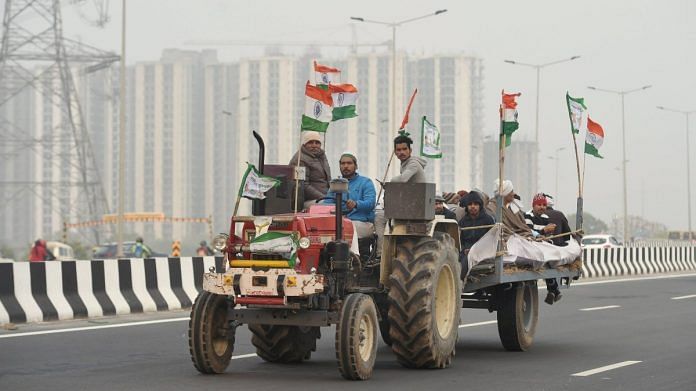Perhaps the most important feature of Indian agriculture was summarised by The Economist magazine in a 2018 article — our governments provide farmers with subsidies worth $30 billion per year, most of which do not reach them, and then take away much more — about $40 billion — by denying them the market price for their produce. These market restrictions arise via the Essential Commodities Act and foreign trade barriers. For instance, export bans are almost always imposed when international prices rise.
Estimates over the past 30 years by the government and independent economists confirm that farmers’ incomes can increase by a minimum of 5 per cent and up to 25 per cent per year if market restrictions are removed. But there is another component of farmers’ losses that no one has yet calculated: The opportunity cost from property rights restrictions that include the seizure of their land (in many cases without due compensation), restrictions on the size of their landholding, and restrictions on the use, sale and lease of their land. This loss probably exceeds $20 billion per year. Both market and property restrictions are sheltered in the Ninth Schedule of the Constitution, away from judicial scrutiny.
When the farm ordinances first came out in June 2020, farmers across India were optimistic that at least some of their annual losses from market restrictions would ease. While the farm laws did not address the bulk of the harms imposed by governments on farmers, they would have allowed a little more market choice.
But the socialists and communists, who said that these laws will lead to the abolition of the minimum support price (MSP), were able to influence some farmers. Farm laws had said nothing about MSPs. In any case, positive subsidies must not be reduced before eliminating all negative subsidies. Nevertheless, an agitation was precipitated and on 12 January 2021, the Supreme Court stayed the implementation of the farm laws and appointed a committee to listen to farmers’ grievances. I was honoured to be included in the committee as then-president of Shetkari Sanghatana, the farmers’ organisation started in the 1970s by Sharad Joshi, which has fought for over four decades against ‘socialist oppressions’.
Also Read: Our survey shows farm laws are popular. Modi was correct in his assessment
A dead effort
The Supreme Court had asked the “representatives of all the farmers’ bodies, whether they are holding a protest or not and whether they support or oppose the laws” to “participate in the deliberations of the Committee and put forth their viewpoints”. Unfortunately, the agitating farmers did not engage with the committee. Still, we took into account all their concerns, which were well known through the media and through briefings from government officials.
Of the 73 farmer organisations representing more than 3.83 crore farmers that engaged with us, 61 (representing 3.3 crore farmers), fully supported the farm laws. Most agitating farmers came from Punjab and north India where MSP plays a significant role. The farmers who were not agitating and engaged with us didn’t have much to say about MSP, which plays no role in their lives. For instance, as a farmer, I have never sold anything at MSP. But even though MSP was not within the scope of the committee, we spent some time examining this issue.
We submitted our final report to the Supreme Court on 19 March 2021. The report identified a range of opportunities for improving farm laws and advised the Narendra Modi government on options for amending them. We also asked the government to communicate better with farmers to allay any unfounded concerns. And we advised against repealing the laws as it “would be unfair to the ‘silent’ majority who support them”.
Had the Supreme Court published the committee’s report in March 2021, the repeal of the farm laws probably could have been avoided, since the agitating farmers would have realised how the new laws increase their income without reducing any positive subsidy.
That report is now a dead letter. The court has no interest in it, as seen from its lack of response to my three letters to it requesting the release of the report. However, the report has educational value for farmers and policymakers alike, so I am making it available to the people of India today.
Also Read: Farm laws repeal wasn’t about UP, Punjab elections. The answer lies in what Savarkar wrote
Draconian laws in agriculture
Agriculture remains in the grip of draconian controls, unlike the industrial sector which was partially liberated in 1991. The reform impulse reflected in the farm laws must not be allowed to lapse. Unfortunately, policies are made in India without public consultation and without any cost-benefit test.
The Modi government failed to undertake prior consultations to identify any misapprehensions and then developed cold feet when farmers started agitating. The move to repeal the three laws didn’t improve anything for the Bharatiya Janata Party either, it was wiped out in Punjab.
To show India how good policy must be made, I am also releasing today a preliminary draft discussion paper on agriculture policy to lay out the full suite of reform directions for the agricultural sector. The scope of the paper illustrates the magnitude of the task ahead of us if we are to liberate farmers from the shackles that have impoverished them since Independence.
Anil Ghanwat is the president of Swatantra Bharat Party and senior leader of Shetkari Sangathana. Views are personal.
(Edited by Srinjoy Dey)



